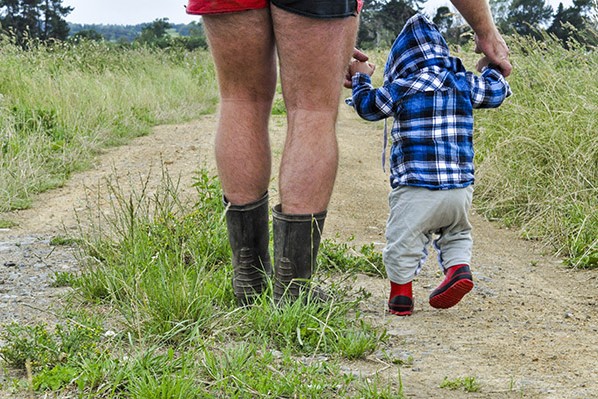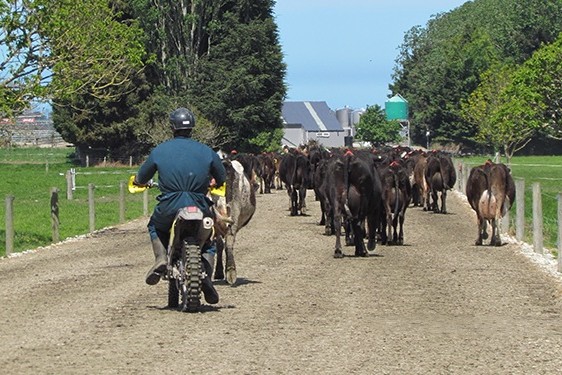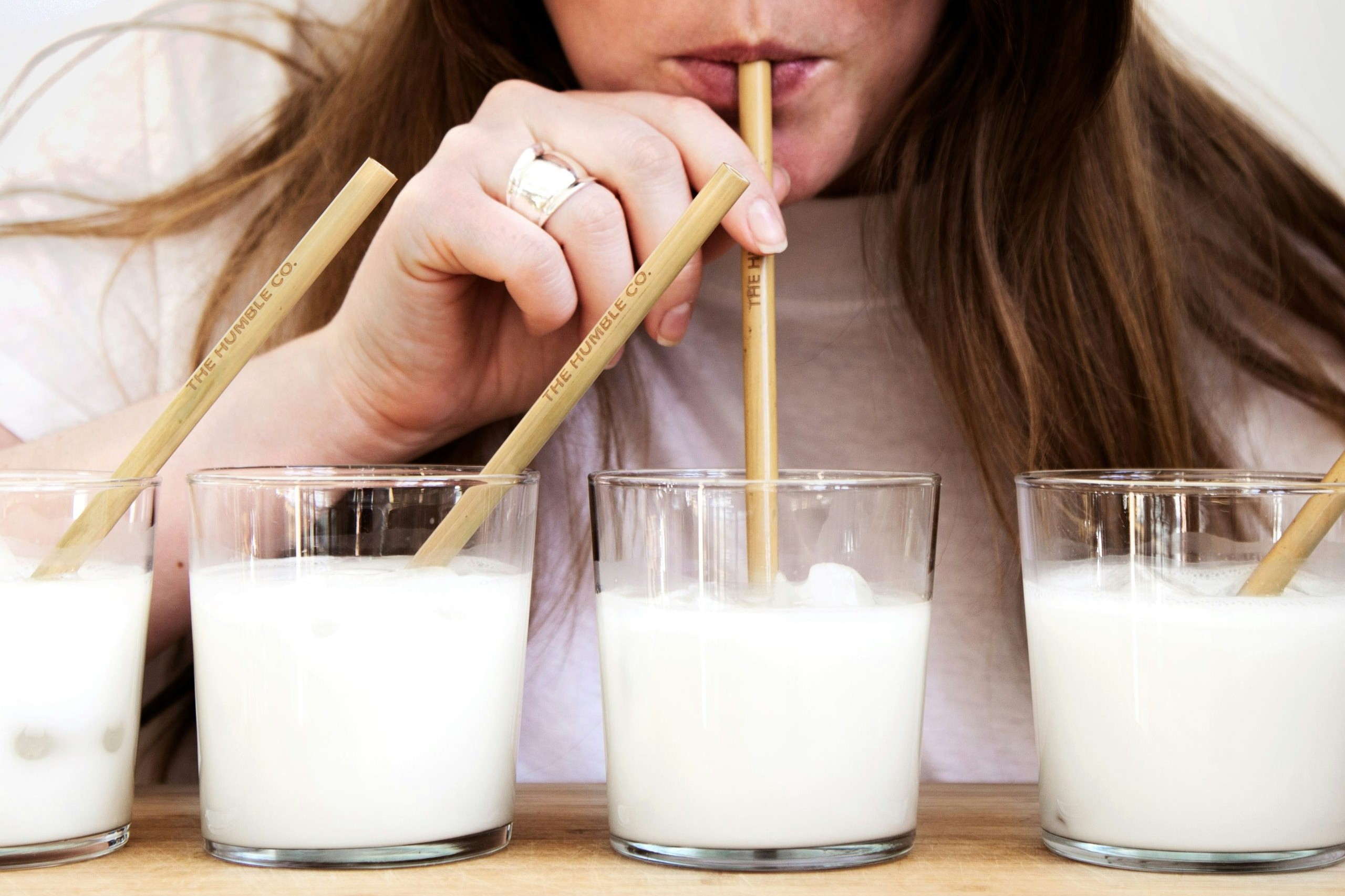The formula of farming plus family equals full happiness does not work for all of us. Jackie Harrigan reports on one woman’s remarkable journey.
Ever feel discontented with your life – even when you know how lucky you are to have a lovely family, home and farming business?
Loshni Manikam has been there – as a farming mother and wife, she hit the wall and owned up to feelings of frustration and lack of contentment back in 2010. And rather than just live with it, she embarked on a journey culminating in launching an online support and training service called Thriving Farming Women.
The outgoing and bubbly Fonterra Dairy Woman of the Year for 2018 had completed a law degree in South Africa and was travelling in Europe when she met her “lovely Kiwi dairy farmer Donald Kidd, who convinced her New Zealand was a land of milk and honey.
Fast forward 20 years to 2010 and she was busily dairy farming in Southland with Donald, was a partner in their dairy equity partnership, raising three children and had everything that should have made her feel totally happy and content.
‘I had all the things that I once would have considered myself extremely lucky to have – a great marriage, three sometimes-lovely kids, our farming business was going well, we had a lovely home, and food in the freezer – but that wasn’t enough – and I put a lot of judgement on the fact I didn’t think it was enough.’
So why didn’t she feel that way? And why did she feel so guilty for wanting more and for feeling unfulfilled?
“There were times when I was literally in tears and questioning my sanity and I couldn’t understand why,” Loshni says.
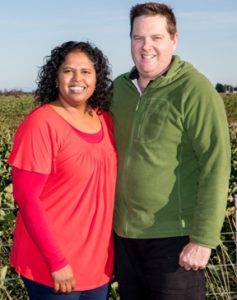
“I didn’t understand why I was so emotional and frustrated – I didn’t know why I wanted more and I didn’t know what ‘more’ looked like.
“And I felt really guilty and selfish for wanting anything else beyond the amazing life I already had.
“I had all the things that I once would have considered myself extremely lucky to have – a great marriage, three sometimes lovely kids, our farming business was going well, we had a lovely home, and food in the freezer – but that wasn’t enough – and I put a lot of judgement on the fact I didn’t think it was enough.
“And I knew a lot of farming women who felt that same way… even if none of us would acknowledge it.”
So started a journey of self-discovery, reflection and upskilling that led Loshni to the place she is now, trying to help other women to explore if their current mindset and the formula is working for them or not.
“That was my real driver – to help other women realise that there is nothing wrong with them, that it’s okay to want more and go out and work towards it.
“But it requires quite a mindset change, to realise that the formula of farming plus family equals full happiness does not work for all of us.”
It’s not as simple as going back to what fulfilled them before they were married and mothering – Manikam says she knew she didn’t want to go back to being a lawyer, she just had to find out what she did want to do, what would fulfil her, what was her WHY?
“The challenge is our current thinking that farming + family = full happiness doesn’t always fit and that it’s not a bad thing.
“I love challenging people’s thinking – especially thinking that no longer serves us.
“It’s deep subconscious stuff and no one consciously thinks it – but it’s the guilt and unhappiness from what others and sometimes the older generation might expect you to be happy with.”
Loshni says hers has been a long and ongoing journey – involving changing her mindset and lots of research.
“I had to take 100% responsibility for my life. I was unhappy with parts of it so I had to choose to change those parts – once I made that decision it was lots of learning and research which I loved – hours and hours of TED Talks and watching webinars, reading books and studies and following experts, that helped me gain knowledge to understand what some of the options were.”
The last piece was the implementation. By 2012 she had decided to train as a coach, and that she wanted to work with farming women – because that was where she saw the highest need and the most pain.
Manikam says deep down she has a utopian view of the world, that people who are thriving are more able to handle the pressures of the world.
“For the whole world to thrive we need each one of us to thrive – we are better people when we are thriving… and that has a positive impact on not just ourselves, but on others too.
“But it wasn’t a linear road, there was lots of up and downs – choosing the tools and techniques that worked for me and constantly checking in with whether it was going to fit.”
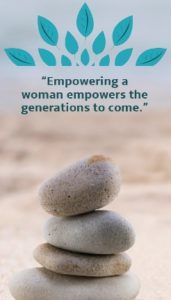 Part of the mindset work she had to complete was the realisation that while she was out working on other things, enjoying the mental stimulation and giving back to the industry through her work, it made her a better person at home.
Part of the mindset work she had to complete was the realisation that while she was out working on other things, enjoying the mental stimulation and giving back to the industry through her work, it made her a better person at home.
“I was a better wife, mother and business partner because I was more fulfilled and contented that I was making a difference for other people as well.
“There was guilt to get over, but I needed to realise that the foundation of my life and happiness, my family, was still there and still my priority – but I was just topping up my reason for being.”
Her skills and knowledge were rapidly picked up by farming women, Dairy Women’s Network, Farmstrong and the Agri-Women’s Development Trust. She completed the Escalator course in 2014 and returned the following year to help run the programme and then stepped up to become facilitator and programme director.
Meanwhile, she still shows classic Imposter Syndrome symptoms saying the Fonterra Dairy Woman of the year judges obviously thought she was deserving but that she is less sure of her deservedness to win the award.
“I looked around at all the other amazing people in the industry doing heaps.
“I was blown away that they thought I deserved it – I have been doing what I really love doing for the last five years, it seemed weird to be acknowledged for doing what I love doing – it doesn’t seem like work to me.”
People said to me how lucky I was to win it, but it’s definitely not luck – I had to do a lot of work and overcome internal challenges and insecurities and have the courage to step out and make changes – I am really proud of myself for doing that and for taking opportunities.
“Whether I fail or succeed is not the most important thing to me, it’s really about backing myself to have a go.”
The $20,000 prize package for personal or professional development has been fantastic for Loshni to learn about and set up her new business – online support and training to help women understand how to make changes to help them thrive in their lives.
She embarked on an online programme with United States personal development trainer Brendon Burchard, on setting up an online business, which included travelling to San Francisco for the five-day Experts Academy experiencing in-person training with 950 very hyped-up Americans.
Hugging five strangers every morning put her outside her comfort zone but she loved the hype and buzz and came home fired up with the psychology around selling, social media, training, communication and storytelling and dealing with failure but keeping going.
“Online learning is such an amazing opportunity, 40% of the world will get high speed internet in the next two years and it’s a great opportunity to reach people who have never been reached before.
“There is a huge hunger for learning – and this gives them the opportunity to learn wherever they are – you can do it at 11pm on the couch in your pyjamas.”
Loshni sees that as key for isolated or busy rural women who don’t access the fantastic in-person training already available in the industry, due to farm activities, small children, distance etc.
Alongside the Facebook presence Loshni has created and is using for short free training and growing the community of likeminded women, the start of the business and programme is face-to-face workshops and events as she hones her message and validates the product she is creating. She has a MasterMind group to help her co-create and test the content, which she says is very exciting.
“It’s been incredibly heartening to get women’s feedback when for the first time they realise they are not alone in thinking and feeling this way – they feel seen.
“There is a big gap between where some women are and where they want to be. I think there are some wonderful resources and knowledge out there, we just need to
get to the people that really need it.”
In future Thriving Farming Women will host online training like workshops, webinars and video training programmes. The videos will be lessons with downloadable worksheets and tools accessed through an online portal.
“Women can watch and re-watch and pause the videos whenever they want,” Loshni says.
“People want very short bites of relevant, targeted learning – they don’t always want to spend a whole year on an issue – but there is an absolute hunger for learning and online learning is just so much more accessible for some people.”
Building a sustainable business requires her to monetise her skills and knowledge and she says the psychology about paying for content makes people really value and use the lessons.
“I have really had to change my mindset around not giving away all my knowledge and coaching skills and I want to attract those people that want to invest in themselves.”
Loshni plans to distil her five years of learning about personal development into teachable resources for other women about time management, guilt, confidence and support and answering the ‘where to next’ questions.
Thriving farming women
Goal: To inspire, support and motivate farming women to start prioritising all their needs again so that they can thrive and be the kind, loving mums and wives they really want to be. Follow on facebook: Thriving Farming Women


